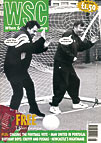 Jimmy Nicholl has returned to Raith Rovers, but has he done the right thing? Gary Oliver thinks not
Jimmy Nicholl has returned to Raith Rovers, but has he done the right thing? Gary Oliver thinks not
Unless a Sunday scandal sheet catches Alan Sugar and Terry Venables sharing illicit candlelit dinners, 1997 will witness no more unlikely reunion than that of Raith Rovers and Jimmy Nicholl. For Raith’s supporters there is relief that hostilities between the club and its most successful manager have finally ceased. But Nicholl returning alongside manager Iain Munro, as Messiah without portfolio, is a bizarre twist which raises more questions than it answers.
When in February 1996 Nicholl fled to Millwall, his was the most rancorous exit imaginable: he complained bitterly of boardroom interference, and in particular of treatment by chairman Alex Penman; the directors retaliated and accused the outgoing manager of having spoken with forked tongue concerning his intentions. The most beatific figure in the club’s history became a persona non grata.
Even down in t’Smoke, Jimmy Nicholl remained the ghost at the feast: he riled his short-lived successor, Jimmy Thomson, by inviting for trial a clutch of young reserves still under contract; pounced during the summer on three of the first team players he had groomed and last autumn even swooped for Rovers’ physiotherapist. For all we know, he also walked out of Stark’s Park with a case full of towels and coat hangers.
Fans naturally had sided with the talismanic Nicholl against the boorish Penman. And the directors presumably believed that their sanctioning Jimmy’s return would pacify what, increasingly, is a disgruntled support. But the board has now compounded its earlier mistake: Nicholl previously was the right man in the right place at the right time, but the club needs desperately to move on and stop clinging to his memory. Rather than worship the Second Coming, many bewildered fans are asking what the hell is going on.
If public comments are taken at face value, hiring Nicholl was entirely the initiative of Iain Munro, with whom Nicholl has remained a buddy since the pair played at Sunderland in the early 1980s. “I phoned Jimmy as a friend to see if I could help him out,” the manager explained. Yet at Raith Munro has been no stranger to the old pals act, having doled out contracts to several of his earlier charges at Hamilton; now he’s helping out a mate unexpectedly down on his luck.
At a time when Raith Rovers already have more coaches than can be gainfully employed, engaging Nicholl to hold his hand appears a tacit admission by the manager that he’s floundering. And he’d be right. Raith is Munro’s fourth managerial job; such is his inauspicious record during this seven year period it would be no surprise to learn that he broke a mirror around 1990.
The players Jimmy Nicholl nurtured and inspired have all but gone, and it’s difficult to imagine how, in the short term, he can benefit a squad that doesn’t know him from Adam. Nevertheless, Iain Munro hailed the return of Nicholl as being “like signing Laudrup, Gascoigne and Cadete.” Yes, he really did.
Jimmy Nicholl pursued many other jobs while manager at Stark’s Park; clearly, as a subordinate to Iain Munro, he simply is killing time and earning beer money until another manager is handed his P45. Nicholl will be favourite to occupy any vacant chair, and he is fortunate that, in spite of his travails at Millwall, his reputation in Scotland survives unscathed: always a media-friendly figure, the Scottish press sympathetically portrayed him as a patsy – an innocent unfairly caught in a a pincer movement by hatchet-man David Buchler and Mouth of the Thames Danny Baker.
Nicholl at least had the good grace to appear sheepish over the circumstances of his return. But by promising that “If I don’t feel comfortable or the atmosphere isn’t right, I’ll just walk away”, he confirms it is only expediency which has brought him back.
Days before his appointment, while guesting for Bath City against Macclesfield, Jimmy suffered the ignominy of being ordered-off just 55 minutes into his side’s 3-0 defeat. As Raith dice with relegation back to Division One, Nicholl’s Rovers return could have just as abrupt and unhappy ending.
From WSC 123 May 1997. What was happening this month